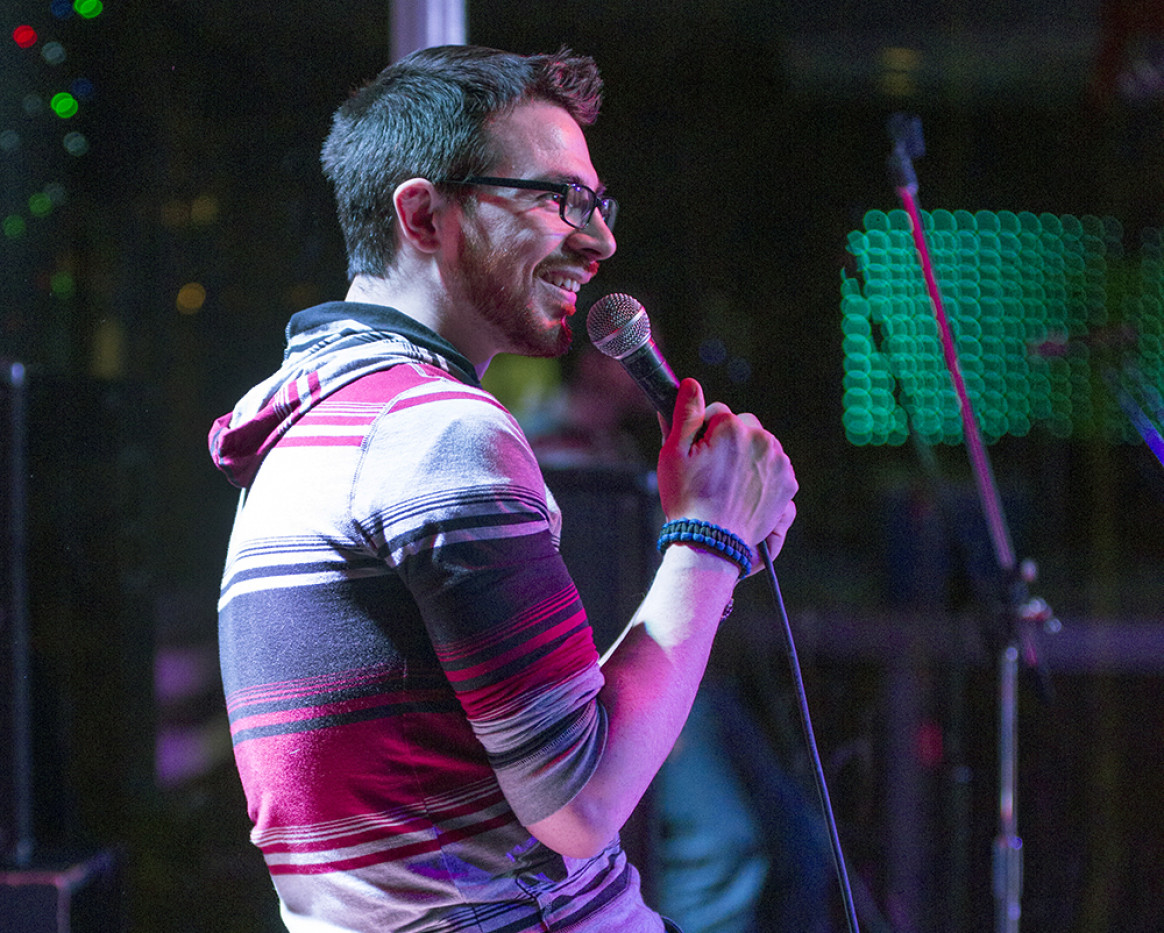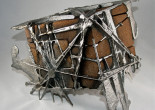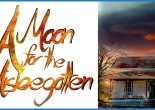No one expects a comedian like Zack Hammond at an open mic night in Wilkes-Barre, Pennsylvania.
His jokes are too sharp. His humor is too refined. His routine is too polished. His demeanor is too professional.
In other words, he’s too good to be practicing on a small stage in front of a dozen or so people on an otherwise quiet Tuesday night. The audience could see it, too, voting him the top act of NEPA Scene’s first Open Mic Night at The Woodlands Inn on Nov. 18.
It wasn’t just a good night for the 27-year-old comic – this was six years of consistent devotion to the craft playing out exactly as it should. Unlike many funnymen, he wasn’t the class clown, and he didn’t start telling jokes in front of a crowd until college, but his dedication on and off the stage is as strong as any lifetime commitment.
Absurd storyteller to comedy headliner
From a young age, Hammond had a growing desire to be on his own and do his own thing, though he didn’t always know exactly what that thing was. When he moved away from his native Maryland to attend King’s College in Wilkes-Barre, the unhappy accounting major became a productive English major after writing a story for a class that changed everything.
“I just started putting all kinds of weird, sick things into it that I thought would be funny and just be insanely absurd, and I got the grade back from the teacher and it said, ‘You actually have a really good knack for writing. You have a very absurd sense of humor that you should try to play into,’” he remembered.
“When I was in college, I started going through the ‘I’m not at home anymore; I can do whatever I want’ phase, and it didn’t really translate to me doing drugs and alcohol. It became, ‘I’m going to be outspoken and just say and do whatever I want,’ and once that part of my brain kind of kicked in, I realize that I had things to say and that I could say them in funny ways and ways that would make people listen.”
 |
Being a writer helped him reinvent himself, his work teaching him to focus his creativity to construct funny and entertaining stories. It was only a matter of time before he would learn to cut right to the chase and simply tell jokes, starting with a talent show at the college that led into open mic nights at bars and clubs throughout the area once he turned 21.
“It was just awful the entire time because, stand-up-wise, I had no idea what I was doing,” Hammond admitted, looking back on those early days.
“I didn’t know how to construct a joke or play to a crowd, deal with hecklers, how to combat stage fright – all of those things. I knew nothing.”
He progressed from there, however, starting with open mics at Wise Crackers’ former location in Scranton, charity events, and pay-to-play shows in his first year. By his second, he was winning competitions like NEPA Comedy Idol, beating out 20 other contestants at Bart & Urby’s in Wilkes-Barre the first year and hosting the following year.
“The competition was based off of how loud the audience could get – not even a vote, just how loud they could be. Two of those people just brought every friend they had ever met in their entire lives to the thing, and they bullshitted their way through that and got people to cheer for them. Then I won that competition by somehow getting their friends to cheer louder for me than them,” he recalled with a laugh.
He quickly went from just saying funny things to constructing longer and deeper sets.
“You don’t get into boxing just to be a good boxer. You get into boxing because you want to be the top in your field. Mike Tyson didn’t become world champion just because he thought it would be fun. He wanted that,” he insisted.
“You don’t get into something and not want to be the best at it. Otherwise, for me anyway, why do it? Why get into it if I’m not going to try to be a headliner? I don’t care about fame. I care about being that guy that goes on last, does an hour set, and it’s funny the entire way through.”
The anatomy of a joke
Hammond cites George Carlin, Richard Pryor, Doug Stanhope, Louis C.K., and Lewis Black as influences on his comedic direction, and as he starts to discuss his philosophy on comedy, it’s easy to see the role these groundbreaking names played in it.
“Comedy, for one, is one of those creative things that you can’t do anywhere else. In writing, you can create a sense of not knowing what’s going to happen, but eventually it’s going to be found out. You can kind of control that through a book, but people can read ahead and piece things together. With movies and stuff, you can do the same thing; you can hide things, you can create something for people to enjoy, and again with that, there’s spoilers. There’s a lot of things built into the way we present things today, like foreshadowing, tone – all of those things that make you enjoy a movie or not. It’s the same thing with all forms of entertainment,” he began.
“With comedy, you have full control of everything. Nobody knows what you’re going to say until you say it. Nobody knows the punchline until you get to it; you can misdirect people, you can play with the mood, you can make them really happy, you can bring them down. There’s just a lot in it that’s a lot of fun to play around with, and I was drawn to it.”’
It’s an outlet that’s been unlike any other for him.
“I can have an idea and I can present it to everybody, and I can do that in a paper or a speech and people would appreciate it, but if I do it with humor, people are going to laugh at it and then it’s going to stay with them as well. That’s what I enjoyed about it. I could be myself. I could say whatever I wanted to. As long as it was funny, you could do whatever you wanted to,” he explained.
 |
“It was just nice to create a joke from the ether of your brain, where you go, ‘I think this would be funny to say,’ and then you find a way to take what you think is funny and make everybody else think it’s funny. That’s the initial phase,” he continued, next developing his five and 10-minute sets into full hours.
“How can I take them on a journey, basically, where we go up and down, side to side, but it’s just a fun ride in the end? That’s what it is for me. Comedy is just being able to create something out of nothing and have an intimate experience with everybody that’s in the room. I’m the only one talking, but we’re all kind of collectively together.”
His “weird passion,” as he describes it, may just come from the fact that he’s the classic definition of a perfectionist.
“There’s always a sense that I have to make everything perfect. It’s a driving force that I haven’t created a masterpiece yet, and that’s what comedy is. If you are really, really passionate about it, you want to be really, really good at it, you have to accept the fact that in the beginning, everything is going to suck,” he emphasized.
“In the writing world, if you look back on something that you did a year ago, six months ago, and you say, ‘Oh, that’s still really good,’ you’re an idiot. What you look on in the past should be absolute crap, and you have to keep moving forward with that notion. What I’m doing right now is awful; it will not be awful when I’m done with it, and that’s what comedy is for me.”
The power of the dark side
He wants the audience to think about his cynical quips afterwards for almost as long as he does, leading him to address heavy topics and deliver darker jokes that take time and experience to execute.
“Initially, it’s not the best reaction [from the audience], and from there I have to figure out what’s going to get the best reaction out of it. Once I’ve worked on it, and some bits take longer, but say after three months, I have a pretty good idea of how to do the bit, do the joke, to where I can get laughs out of people, and then once I start getting laughs, then it’s just a matter of either adding something to it, taking things away from it, to get more laughs, to get better laughs,” he detailed.
“It’s not just the things that I’m saying; it’s how I’m saying them, too, how I’m presenting the idea. There are nights where I go on stage and I just look really pissed off, and that can be really off-putting to people, and if I’m off-putting to people, the stuff that I’m about to do is not going to go over well. The fun thing about it is if I’m in a good mood, I can say some of the worse things that I’ve ever said, but because I’m in a good mood, the audience is relaxed and they’re totally fine with it and they understand it’s all just a joke. If I’m mad and I say some of the things that I say, I’m just coming off like a hatemonger or a monster, and that’s not what I want.”
His bitingly sarcastic bit about finding it humorous how blatantly little China cares about human rights, for example (it starts around the 3:30 mark in the video below), may immediately offend and enrage, but the message that lies just beneath the punchline is what makes it all work.
“I’m recognizing that we should care about [human rights], but when one group doesn’t and it’s not you, it’s kind of OK. As I get deeper and deeper into that idea and I mention that there’s a ‘No Child Left Behind’ law and it means something different than it does here, it’s that juxtaposition that’s funny because you realize, ‘Oh yeah, ours is helping children with education. Theirs is killing one so there’s not too many of them.’ To some people, there’s still silence, and then it’s the exaggeration, I think, that takes people over the edge,” he said, referring to his next line about officials punching babies just moments after the Olympics are over and foreign visitors have left the country.
“It’s so over-the-top and ridiculous that it’s funny. Then people go, ‘Oh, he’s not saying it’s OK to abuse people. He’s just saying that that’s just what they do.’ It’s so insane that they would take a baby and put it on a pedestal and just punch it just because nobody’s watching them. There’s an absurdity to that. If you take it at face value, it’s a very, very dark joke. It’s a very dark thing to say, but in building it up to that point, you’ve created a world where it’s OK to say something like that, and that’s what I try to do with most of my stuff.”
This isn’t for shock value, either – it’s a coping mechanism to address and deal with subjects we’d all rather not face, particularly in our entertainment.
“I think when you joke about dark subjects, it’s almost laughing in spite of the fact that it’s a dark subject. This is so absurd that it’s funny. I don’t think torturing people or hurting people or killing people is right in any shape, way, or form, but if you look at them from an absurd point of view, then they do become funny. It’s one of those ‘mirror up to society’ things,” Hammond noted.
“We all accept that this is going on. You can write ‘Darfur’ on a sidewalk as much as you want. Until you actually get up and do something about it, you’re not helping anybody; you’re letting it happen. So when you’re in a comedy club atmosphere or a nightclub atmosphere or whatever atmosphere you’re doing comedy in, you create a bubble in that sense and you go, ‘These are all things that are going on. It’s no secret to anybody that they’re going on. Let’s try to alleviate the stress from them and just laugh at how crazy it is or let’s laugh at the contradictions between this dark subject and all these lights things that we want to believe are true,’ but in reality, this is the real truth.”
 |
And the brutal truth can set you free.
“There is nothing I wouldn’t joke about. If I can find a way to make it funny, I will do it,” he declared without hesitation.
“I don’t think there should be any subject that should be off-limits. It’s just a matter of finding what’s funny about it.
“That’s what I try to figure out. OK, I have a really bad idea in my head. How do I justify what I’m about to say? If you can justify it, there’s no problem. If you just go out and say a really terrible thing with no justification for why you’re saying it or you’re just a nutcase who found an open mic that night…”
He trails off, amused by the latter image.
“Jokes and making people laugh is a chaotic energy, but behind the scenes to get to that, there’s a very deep structure and order to everything in order to make things work out the way they do,” he continued.
“You can’t give away the ending to the story. The ending is why you’re telling the story, so how do you build towards that? We also have it in our language as well. We all know how to tell stories, and comedy is just a more refined version of storytelling.”
It’s hard to imagine after hearing all this, but Hammond is not only normally quiet, but he once suffered from stage fright on the verge of panic attacks, and while theater courses in high school and college helped, it wasn’t until he was allowed to express his own voice in his own way that he truly felt comfortable on stage.
“People that have known me personally and then see me onstage think it’s a little wild because I’m quiet because that’s where I get to talk, so there’s no need for me to get into arguments or debate people. That’s where I’m going to do it all,” he pointed out.
“Obviously I’m not going to be able to come up with the things I say without being that person somewhere. It’s my regular personality on stage with the volume turned up just a little bit more than it needs to be because that’s my arena, basically. I’m not just going to go out on the street and start saying the things that I say; I’d be crazy. But if I go on stage, I’m allowed to say the things that I want.
“I have those ideas, I have those philosophies, I believe those things, but I’m not rambling to anybody outside of there, except for my wife.”
In the early stages of their relationship, there were arguments as he split his time between her and the stage, but in the end, the two loves of his life coincided, and he seems quite happy with both. She even supports his decision to move to Philadelphia within the next year or two to further pursue his stand-up career.
“She doesn’t come before comedy, and comedy doesn’t come before her because they’re separate entirely,” he clarified.
His wife is now part of his routine, which has grown increasingly personal as he moves forward.
“Nobody else lived my life, so nobody else can do the jokes about my life. It’s more fun and liberating, in a way, to talk about stuff that’s happened to me and the way that I perceive things that go on in my life, as opposed to just telling a joke.”
Jesus, Scranton, and light-years away from it all
Even that isn’t enough for Hammond sometimes – the perfectionist kicks in whenever he witnesses other great comics in action.
“I enjoy going on after people better than me. I still do because I want to be better than them. Always go after people that are better than you – that’s the only way you’re going to make yourself better,” he advised, noting his “weird paranoia” that drives him to be funnier than anyone else.
“After you’ve been doing it a while, you see new people coming up, and new people say things that are really funny that you didn’t think of, so the ego is going to take over and now I have to be better than anything that they might come up with that’s slightly funnier than the entire thing that I’m doing.
“It’s almost like people that find Jesus – it’s a weird calling that you kind of just have to embrace.”
Comedy seems to be the only personal savior he needs, guiding him through the tough audiences of Northeastern Pennsylvania and making major cities feel easy by comparison.
“The audiences here are some of the weirdest, most fickle, toughest audiences I have ever seen because I’ve been to other cities, and if something’s funny, they’ll laugh at it. Here, if I say something this week that’s funny and I go back the following week and say the same thing, I can get no reaction from them and it makes no sense whatsoever,” he commented, still baffled.
“Some nights, you’ll get the people that really, really want to laugh and have a good time. If you say something that’s funny, they’ll laugh. Other times, you get those audiences that are, ‘Well, we’re here. It’s something to do, so we want to hear a specific kind of comedy or a specific kind of music. If we don’t hear what we want to hear, we’re not going to be happy.’”
Proving the old adage that if you can make it in Scranton, you can make it anywhere, his shows outside the area have been much more successful and encouraging, from his first one-hour special taped in one night three years ago called “Impossibly True” to his recent gig at The Alternative Gallery in Allentown, where he performed a completely different set that went over even better.
For Hammond, it’s the only reaction he’ll accept, earning respect and recognition one laugh at a time.
“[My current material is] about me, my marriage, who I’ve become, and it’s so much better in every way than the first hour that I did because now I know who I am. I discovered my voice. I know how to be me without having to think about it hard,” he enthused.
“I hope after I film this one and start working on my next hour, I’ll look at this one and go, ‘That was terrible. Look what I’m doing now. This is light-years ahead of it.’”
Photos by Robb Malloy/NEPA Scene
by Rich Howells
Rich is an award-winning journalist, longtime blogger, photographer, and podcast host. He is the founder and editor of NEPA Scene.




